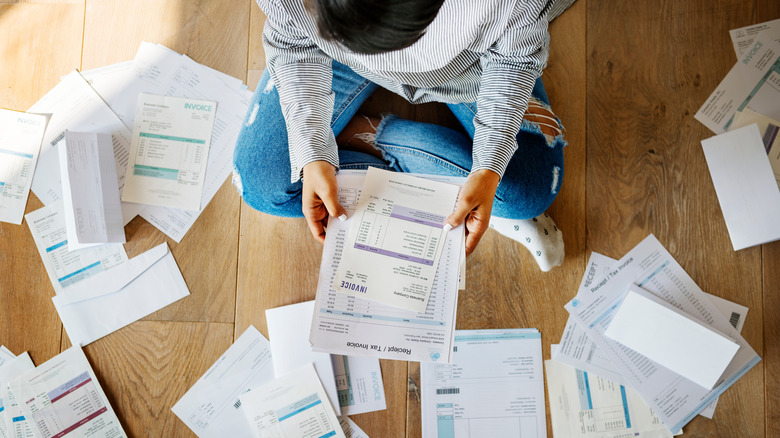What Is A Loan Origination Fee?
Most homeowners worry about the interest rates the lender will charge them when taking out a mortgage loan. However, you should keep in mind that the creditors also charge other types of payments, like loan origination fees, when executing your debt. Rocket Mortgage explains that before processing your loan, the credit provider will judge your qualifications and calculates the debt to ascertain how you will pay it. Lenders charge these fees to make money for funding other mortgage loans.
The loan origination fee is the upfront charge the creditor makes to cover the miscellaneous costs of paperwork preparation, processing, or underwriting your debt. Depending on your lender, the costs of these fees may differ. For example, while some might charge separately for the application process, others will collectively charge the three stages as a single fee. The cost of the fees ranges from 0.5% to 1% of your total loan balance, per Rocket Mortgage. The money the lender makes lies in the loan origination fees and the money paid for servicing your debt.
Doing a little research to weigh the preferable lenders with more agreeable quotes before applying for a home loan is necessary. Read on to better understand these origination fees for your next mortgage application.
Understanding how loan origination fees work
Borrowers charge an origination fee based on the percentage of the total loan. It is a representation of their original services, and on it, you will often find mortgage points on your interest rates. It can also represent a higher percentage of the debt balance on smaller loans. In the 1900s and 2000s, lenders collected huge original fees at a rate of 4% to 5% of the total loan amount. Later on, the government passed laws that reduced the fees to 1% or even less due to public pressure.
According to Investopedia, a single discount point now equals 1% of the total loan balance. This means a lender can make $3,000 on a $300,000 loan if they charge a 1% origination fee. Although you can purchase the points in increments down to 0.125% (per Rocket Mortgage), you will pay the points in exchange for obtaining a lower interest rate. If you want to avoid closing costs and ultimately secure negative points, you can go for a lender credit. It helps you enjoy higher rates in exchange for lower closing costs, and you can collect the expenses into the loan period.
How to cut down the origination fees
When applying for a mortgage, the lenders usually present their terms and conditions. Since there is no definite rule on how much they should charge, you can take advantage of the opportunity and negotiate. This way, the borrower might reduce your charges on the originating fee. Quicken Loans states that you can reduce the charges in various ways, such as paying your closing costs upfront or accepting higher interest rates.
If you have assets, a good credit score, and a promising income, you are better off negotiating for better terms. When loan lenders feel that you make a great candidate for a loan, they will give you a chance to negotiate so as not to lose out. Before applying for a loan, you can also shop around to compare the lenders; look out for creditors who charge the same fee or lower and make a comparison.
Another option is to take lender credits to minimize closing costs by exchanging them for higher interest rates. Ask the seller to pay the origination fees if you are buying a home. This is only possible if seller concessions are included as part of the purchase agreement. Although the seller might not take the offer, they might consider it if they are struggling to get the property off the market. Some loans also allow you to get gift funds from family, friends, employers, or organizations to cover your origination fees.
How to compare loans with an origination charge
Again, it is best to compare different lenders' origination fees first before diving in to get a mortgage. An evaluation will be of assistance in figuring out the possible additional fees that might help you avoid paying for extra costs on loan. According to Bankrate, to get the best loan deal that works for you, you have to look at the length of your debt repayment and the annual percentage rate (APR). Look around for the lender offering the best mortgage rates to know who will provide what you want. Ask the creditor if they charge origination fees and check out their terms and conditions to see if these are negotiable.
Your APR depends on the interest rate, although it might also consist of the origination fee. Avoid including the charge on the APR when estimating the total cost of your loan repayment. If you do so, you might come up with a larger amount than what you would pay, so it is crucial to look at the length of your loan repayment. You have to know the amount you will pay each month for better planning: The higher the monthly installments, the shorter the loan term and the lower the interest rates.
When to pay the origination fees
Paying for closing costs depends on whether it is a refinance or a purchase. An origination fee is part of the closing costs but Rocket Mortgage states that other expenses may include different charges. The first closing cost is the application fee, which the lender repays you on loan closing. The lender uses it to cover the credit check or appraisal cost, and they consider it as a deposit. You would pay the credit check and appraisal fee separately when closing the loan if you hadn't covered it as a deposit.
Another expense you may have to pay is the funding fee, which is normally 1.4% to 6%, depending on factors such as the down payment amount, per Rocket Mortgage. You pay this fee to the Department of Veteran Affairs (VA), and you can either cover it when closing a debt or build it into the loan amount. The loaner covers the mortgage insurance as an upfront funding fee or guarantee fee. In such cases, you will pay a specific percentage of the total loan when closing. You'll also pay for prepaid mortgage interest points when you decide to buy down your interest rate by covering for interest upfront.
Other charges are the title insurance, which you can negotiate with the seller to cover, and escrow fees that protect the buyer's and seller's collective fees for closing costs. You might also remunerate for charges like attorney fees, recording fees, property taxes, or homeowners insurance.
Other extra fees to be cognizant of
Although the origination fee is the main part of the loan, there are other significant charges the lender imposes that you must know. Using the APR, you can easily compare the total cost of your loan. According to Rocket Mortgage, the commitment fees, rate lock, and processing fees are some additional expenses you need to look out for. You pay the lock rate fee to gain a privilege when the interest rates rise.
The commitment fee is the amount you set aside to give out in the future in exchange for the loan. Lenders charge this cost as an enclosure on the market's changing conditions. If approved, you will get the money when the loan closes. The processing cost, which some people call the underwriting fee, is the charge the lender makes aside from the original fee. The money is for the processing of your documentation so that your loan is eligible. Sometimes when you don't make the loan repayment on time or make them earlier, the lender can charge you late payments and early repayment fees, respectively.





